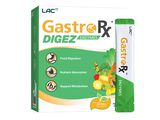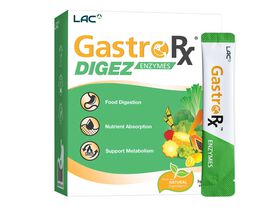Are Digestive Problems Ruining Your Ramadan?

5 Tips to Prevent Digestive Discomfort.
During the holy month of Ramadan, our Muslim friends fast from dawn to sunset. Praying and fasting are part of the sacred month. Constipation, diarrhea, heartburn, and acid reflux are all frequent digestive problems during this period due to a change in regular mealtime routines, the types and the portion of foods consumed during non-fasting hours.
Indigestion, also known as dyspepsia or stomach discomfort, occurs when the gastrointestinal tract fails to process food properly, which may increase the risk of GERD.[1] Different people may experience indigestion in various way and the symptoms may be felt occasionally or as often as daily.
You may encounter some unpleasant symptoms if you have indigestion, including:
Early satiety. You are feeling full even after consuming a modest amount of food.
Discomfort in the stomach. You experience burning sensations or pain in the upper abdomen after a meal.
Nausea. Feeling of vomiting.
Bloating and belching. Burping is more common in those who have acid reflux because they ingest air more frequently.
Digestive problems cause discomfort and embarrassment, which may ruin your fasting period. To ensure you feel great this Ramadan, here are 5 healthy tips to keep your digestive system happy and healthy throughout the month.
1. Break your fast at a slow pace
Taking your time when eating is beneficial not just to your digestion but also to your weight loss. Sudden binge eating may lead to overeating and increased stomach pressure, which may slow down the digestion process.[2]
Try breaking your fast with a bowl of soup or a cup of water to rehydrate yourself after a long day of fasting. Consume your main course 10 minutes later. This practice will provide you a sense of fullness to prevent overeating and safeguard digestive systems.[3]
2. Foods to be avoided
Limit spicy and oily foods when breaking the fast as these foods may irritate the stomach lining which can lead to stomach cramps and trigger indigestion. Furthermore, eating too much salty food might cause bloating in the stomach and induced thirst. Sweet and sugary foods not only contain very little nutritional value, but they also cause blood glucose levels to plummet, which makes you feel hungry constantly.[4]
3. Stay hydrated
Strategically plan your water consumption during Suhoor, Iftar and throughout the night. Divide your water intake into 8 to 10 glasses each day, which is equivalent to 2 liters of water required by your body daily. Drinking an adequate amount of water regularly aids in the digestion of meals and absorption of nutrients. Water also softens stool which helps in preventing constipation. Avoid carbonated drinks as they are high in sugar and induce bloating due to the gas in the stomach. Caffeinated beverages should be avoided as well because they induce thirst and urinate more often, resulting in dehydration.[5]
4. Recommended foods to eat
Consuming a proper portion of foods that contained carbohydrates, protein, and fiber will help you to stay energized throughout the day. Fiber-rich fruits and vegetables are crucial as they boost the sensation of fullness and help prevent constipation. Skinless chicken and fish are a great source of protein while limiting your fat intake. Brown rice and wheat bread are complex carbohydrate, which enables you to sustain energy levels for a longer period.[6]
It is also advisable to indulge in probiotics to improve your gut health. Start your breakfast with oatmeal, one cup of low-fat yogurt, or kefir to aid digestion. Alternatively, you may opt for supplements to protect your gut during the fasting period. A glass of milk, nuts, and dates are recommended if you don’t have a large appetite in the morning.[7]
During Iftar, consume foods rich in fiber to prevent a burning feeling in the stomach caused by high gastric acidity levels due to fasting. Protein and carbohydrates are also important to replenish your energy level.
5. Take a light walk
A 10-minute brisk walking after a meal is best for your body to strengthen digestion, stimulate metabolism to burn calories and keep stomach problems away. Sitting or lying right after a meal might cause acid reflux and heartburn issues. If you don’t feel like walking outside, you can simply walk around the house for 10minutes.[8]
These healthy tips are applicable to adults, children, and teenagers. They may follow these recommendations to keep focused and energized throughout the Ramadan month.
[1] https://www.emedicinehealth.com/indigestion/article_em.htm
[2] https://www.dietitians.org.my/health-info/minimise-stomach-upsets-during-ramadan
[3] https://iamherbalifenutrition.com/health-and-wellness/ramadan-foods/
[4] https://emirateswoman.com/7-health-tips-while-fasting-during-ramadan/
[5] https://gleneagles.com.my/penang/articles/healthy-eating-during-ramadan
[6] https://www.healthxchange.sg/food-nutrition/food-tips/ramadan-fasting-eat-suhoor
[7] https://www.healthxchange.sg/food-nutrition/food-tips/ramadan-fasting-eat-suhoor
[8] https://timesofindia.indiatimes.com/life-style/food-news/why-a-10-minute-walk-after-eating-meals-is-important/photostory/84138984.cms?picid=84138992










